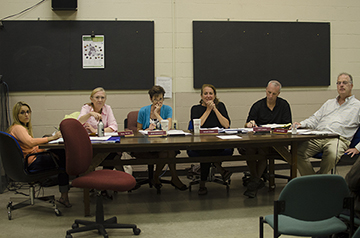
The New Paltz Town Board recently approved a $10.33 million budget with a 4.3 percent spending decrease of $567,509.
New Paltz Town Supervisor Susan Zimet said she had to make sure the budget complied with the comptroller’s guidelines because “the last few town budgets by the town had not.”
This required her to create a budget that allowed the town to work at an “affordable cost” based on a “realistic perspective,” she said.
“I was looking at cost reduction in terms of spending less money and providing the same services if possible, which we were able to deliver,” Zimet said. “We cut $567,509 from actual spending [appropriated]…and the taxes that we’re levying [are] close to half a million as well [$454,789].”
Zimet said even though the budget is in line with the comptroller’s recommendations, there are mandated state expenses that the town has no control over including retirement, disability, medical insurance, social security and worker’s compensation.
“[These expenses] have increased from $593,614 to $2,920,657 in 14 years [or] a 492 percent increase,” she said. “How does a town government absorb that kind of increase without smacking the taxpayers? When most of your increase is being driven by the state, where does the town go from there?”
New York State has a 2 percent property tax cap, meaning property taxes cannot be raised more than 2 percent from the year before.
If spending was kept under the property tax levy, Zimet said she would only have to worry about the tax rate, not the cap. She said that based on the last administration’s 2012 numbers, she was able to find a 4.3 percent tax rate reduction.
“People will see a reduction in their tax bills, assuming their assessment hasn’t gone up, [and] a reduction in their property taxes, tax rate and reduction in the cost of delivering services for the Town of New Paltz without losing any services.”
The town board’s goal was to provide taxpayers with a budget that did not accept the 2 percent increase, but delivered a spending tax decrease, Zimet said.
“It’s not acceptable to keep increasing your budget. You have to do the work to deliver a realistic budget and reduce it on behalf of the taxpayers because of the extraordinary pressure they’re feeling,” she said.
New Paltz Town Councilwoman Kitty Brown said the town has to pass a budget each year, but it’s hard to find the balance between state mandated expenses and providing services, such as recreation.
“It’s a tough struggle because, at this point, about half of our budget goes to retirement for new and old retirees, and other similar expenses, that by contract we are obliged to provide,” Brown said. “Recreation is not as robust as we’d like it to be, but we try. I think it’s going to be harder to schedule events at the community center, but we were able to keep funding for most organized sports.”
Brown said while recreation “took a pretty big cut,” the board did not cut any jobs or positions they felt would affect public safety.
“There will still be the same amount of snow plows, and the consolidation of those departments [Building and Grounds, and Highways] will deliver the best services possible at a lower cost,” she said.
When prepping the preliminary budget, Zimet said she asked all the department heads to give her a “zero percent and minus 10 budget” which showed what departments could and couldn’t afford to lose. Under the joint consideration of Zimet and Chief of Police Joseph Snyder, the police department underwent a 7.2 percent budget cut which had to do with shrinkage when a retiring officer is replaced with a new one and the salary differential leads to savings, she said.
“There was a little bit of controversy about the police, but the department is completely funded…based on what the chief believes is the right way to allocate resources,” she said. “The chief had given us 4 percent and 10 percent reduction. I took [those] and came up with a 6 percent budget…that I put into the preliminary budget. He came back with the 7.2 percent…and once the chief was recommending that budget, who am I to fight him on it?”
Zimet said she believes she’s delivered a “lean budget,” but she knows she won’t be able to duplicate these kinds of cuts next year. She said it will be hard to compensate for increasing state revenues in next year’s budget if the town and village stay the same.
“We can’t continue to operate under the same paradigm,” Zimet said. “The increase of mitigation with the state in regard to retirement, the loss of revenue from economic climate and the cost of moving the services is a really tough balancing act. It’s hard to repeat magic every year.”

